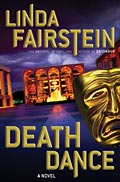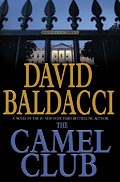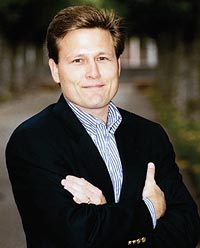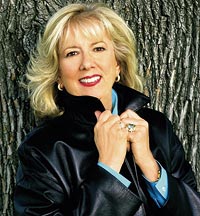Novelists Baldacci ’86 and Fairstein ’72, Entertain Booklovers
In March, UVA Law School alumni David Baldacci ’86 and Linda Fairstein ’72 returned to Charlottesville to headline a Virginia Festival of the Book event, “From Law to Literature: Lawyers Who Write Suspense.”
Thomas J. Nolan, a nationally recognized criminal defense lawyer, was scheduled to moderate but things took an unexpected turn when his air travel turned into a logistical nightmare. Robert Vaughan, president of the Virginia Foundation for the Humanities and sponsor of the program, stepped in and pinch hit as moderator—with about seven minutes’ advance notice.
Robert Vaughan: This is “From Law to Literature: Lawyers Who Write Suspense.” Both are University of Virginia Law School graduates. Both have practiced law—one in New York, one in Washington—and both have turned their hands to wonderful, successful, enthusiastic, interesting, and compelling fiction.
David’s latest book is Hour Game and it’s the tenth of his works. Absolute Power was the first. He’s also written a couple of books outside of the legal mystery genre: The Christmas Train and Wish You Well—a book set in southwest Virginia that focuses on a couple of children and based on David’s own family history and experience. That book became a national bestseller and was used for the program called “All America Reads,” a website that’s still available [www.allamericareads.org] and still has hundreds of pages of information, articles, criticism, commentary, and lesson plans for the use of the book in schools. David was born in Virginia and still lives here.
Linda, whom I only just met tonight, I’m sorry to say, has seven novels and one non-fiction book. Her most recent is Entombed. She, too, as we said, is a UVA Law graduate. She went to Vassar as an undergraduate and was actually born, I discovered this evening, in Mount Vernon, but not Virginia; Mount Vernon, New York, which is a suburb of the City—near the Bronx. I found it really intriguing that her classmates at the University of Virginia Law School created a Linda Fairstein public service scholarship (more), a significant tribute, it seems to me, for your classmates to do that in your honor.
Her first novel, Final Jeopardy, introduced the critically acclaimed character that is the central figure in her works, Alexandra Cooper. Linda lives in Manhattan and on Martha’s Vineyard.
So, welcome. Welcome to the two of you.
We were talking a little bit before we came out, when we were back in the green room, about why they write, why they write fiction, how they moved from the practice of law to the practice of writing, and, Linda, let’s start with you.
Linda Fairstein: My dream, my ambition, as a child was to write and to write fiction. I wrote short stories and longer stories and poems and things that adolescent girls do—a lot of guys, too—and I had a very loving and very practical father. When I’d say “I want to be a writer when I grow up,” he used to say, “You have nothing to write about—get a job.”
 My other interest was public service. I was very much a child of the John Kennedy—President Kennedy—generation; the “ask not what your country can do for you, but what you can do for your country” pull was there for me. The call of public service, which had resonated with so many people of my age, is what brought me to law school and to this great Law School. And for me, this Law School is responsible for everything that followed. It is my very rich and very fulfilling career in the law and years as a prosecutor that gave me such an exciting profession at the bar, but also so much to write about.
My other interest was public service. I was very much a child of the John Kennedy—President Kennedy—generation; the “ask not what your country can do for you, but what you can do for your country” pull was there for me. The call of public service, which had resonated with so many people of my age, is what brought me to law school and to this great Law School. And for me, this Law School is responsible for everything that followed. It is my very rich and very fulfilling career in the law and years as a prosecutor that gave me such an exciting profession at the bar, but also so much to write about.
I’m not one of those lawyers who wrote so that I could stop practicing law. I had a very hard time stepping away from the office. I wrote five books while I was doing both jobs, so I always wanted to write fiction and I’m very happy being able to do both things.
Vaughan: I mentioned earlier that David is a passionate advocate for literacy, but you said that you still do pro bono work as well and I thought you might mention that.
Fairstein: Well, I follow David’s support (and all support) for literacy and I’m very involved with Literacy Partners in New York. It’s my second most favorite non-profit work, but most of my advocacy is on behalf of victims of violence.
My specialty was prosecution of crimes of violence against women and children. I stepped away from the D.A.’s office in 2002, but I’m still very engaged in that work and still do a lot of legal work for victims who can’t get access to the system.
Vaughan: David?
 David Baldacci: Probably the thing I hear most frequently when I’m on a book tour is people come up to me and say, “You know, there’re an awful lot of lawyers who write fiction.” And I say, “Well, you know, you’re right!”
David Baldacci: Probably the thing I hear most frequently when I’m on a book tour is people come up to me and say, “You know, there’re an awful lot of lawyers who write fiction.” And I say, “Well, you know, you’re right!”
I say it tongue-in-cheek, but when you think about it, some of the best fiction I ever wrote I probably wrote when I was a lawyer. As a lawyer, I was paid to write persuasively on behalf of my client. In a case there’s generally one set of facts—so how can each side be so opposed to the other based on what is supposed to be the same set of facts?
Well, it’s how you put those facts together and how persuasive you are on behalf of your client, as opposed to the other lawyer on behalf of hers. But my early career was much like Linda’s. I started off writing short stories in high school. Because I loved to read, I loved to write. To become immersed in someone else’s words is a powerful talent. I don’t have any sounds to share. I don’t have any pictures to share in my book. I know that doesn’t sound very exciting, putting little symbols together on a page, but if you do it just the right way, it’s amazing the impact you have on people. I wanted to have that impact on other people.
I went to college. I worked all the way through college writing stories and screenplays. I worked at law school while my classmates were much more about trying out for moot court and Law Review. I was about writing short stories on Hydraulic Road. I knew I was going to be a lawyer, but I just wanted to write as well. I wasn’t a person who hated law and wanted to get out of it and, in fact, in defense of writing, I was a writer who happened to be an attorney as well. And I had a very fascinating life.
I had a good career, but I liked writing better, because as a writer you can call the shots. As a lawyer, particularly in civil litigation, trial lawyers in the private sector, the only thing you have to sell is your time. The more you sell it, the more money you make and everybody else is happy, but consequently you have no control over your own life.
For me, nothing is as great an experience as being in the world of my own imagination. My career provided me a wealth of information; except for the sex and the murders, I didn’t have to make a single thing up.
Vaughan: Now, Linda, you have followed a single character and I wonder if you could tell us a little bit about how the character developed for you and how you have taken her through the novels.
Fairstein: I cheated. It was easier for me to take the old “write what you know” and I have always loved procedurals. [Editor: The police procedural genre emerged in the 1940s; it provides details of police routine and investigation techniques in the solving of a crime.] I read everything in that genre, but I’ve always enjoyed procedurals and I always loved watching the real work people in the field do to solve cases. And I have to say that in the 30 years that I’ve prosecuted, not once did a P.I. solve a case that the N.Y.P.D. couldn’t solve.
So, I had in mind for a long time to create a protagonist who was a sex crimes prosecutor. I very much wanted to entertain, but also to sort of educate, very gently, about the same issues. People who would not go into a bookstore and buy a non-fiction book like my first one—“Sexual Violence”—will sit on a plane or a beach with crime novels, so, as I’ve said ad nauseam probably, Alexandra Cooper is a younger, thinner, blonder, version of me and it’s very easy to put myself in her head and keep her telling stories. She’s also aging very slowly; she’s only aged a year and a half in seven books. I do have designs on doing a stand-alone book at some point, but for me, the continuing characters are a very comfortable place to be.
Vaughan: So, in some ways, Linda, your fiction grew more directly out of your practice of law—an interesting contrast between the two of you.Well, what do you think about shows like Law and Order SVU?
Fairstein: I’m often asked about the TV shows which are very entertaining, CSI, Miami, Europe, Charlottesville—whatever is next—whether it’s prosecution or investigative work. It’s completely unrealistic to anyone in the business— from the equipment of the police department, the women who dress like they do on the job, to crime scene investigators who would never do the interrogation of the suspects and direct investigation. They would do brilliant technical crime scene work, but that’s it. Dick Wolfe has been ingenious in creating that whole NBC Law & Order franchise. He’s hired a lot of former detectives, a lot of former prosecutors, and he rips cases from the headlines in New York—actual news stories that are familiar to everybody—and solves them before my colleagues and I ever did, which is always disturbing.
After about a year, we started having problems on cases with jurors who were so familiar with cases from the events in the newspaper and Law & Order. We’ve actually had experience of a juror or two saying “I know he didn’t do it,” because they saw the show. We’ve also adjourned several major cases because a juror might have seen the show on a Friday night and the trial was to start on a Monday. We just knew we couldn’t go forward until we had 11 jurors who didn’t see the show.
But, the other answer to that is the nicest thing about the SVU franchise. Mariska Hargitay—that’s Detective Olivia Benson—and everybody in that cast has become involved with the crime victim’s advocacy movement, both in New York and L.A., and they give time and they give money. Mariska is a rape crisis advocate. She took all the training. She’s on a 24- hour hotline call every couple of months and it’s been wonderful. I use the word “star power”—but these shows have brought star power to an issue that for my young adulthood and the first 10 years of my professional life was an issue not talked about—not by mainstream media and not ever dreamed to be the subject of a popular television show in prime time. By taking an issue everyone’s been silent on and treating it the way they do, I think it has brought a lot of attention and much more dignity to the subject.
Vaughan: Let me take you back to your childhood. David mentioned that he was writing early on. What were you reading?
Baldacci: I think the first book I ever read, when I was five years old, was a book called The Magic Squirrel. Okay, it wasn’t Dostoevsky, but I remember holding the book; I remember the story. I remember being in the library, being surrounded by books—it was a very comforting feeling.
Fairstein: My first book was Robert Louis Stevenson’s A Child’s Garden of Verses. And mostly the children’s classics—I did not have The Magic Squirrel—I’m sorry. I had a brother, so I read the Hardy Boys before I found Nancy Drew and a series of books called The Signature Biographies—I loved reading about people’s lives. I loved history, mostly presidential and mostly about men—with an occasional Clara Barton and Florence Nightingale thrown in. I went to the library every other week to get a fresh supply, and my mother would take an extra supply. In my adolescence, it was Poe and Conan Doyle; everything from that point on had a crime or mystery focus.
Vaughan: Well, it looks as though it has worked.
Fairstein: While I was a student, the Law School used to be in Clark Hall on the main Grounds; we walked the Lawn and we’d pass Poe’s room. Many of my Law School colleagues didn’t care, but I was intrigued. Then I was more intrigued when I learned about Poe’s presence in New York and Alex Cooper’s world. [Editor: Poe features prominently in Fairstein’s Entombed.]
Vaughan: When you’ve finished a book, are you thinking about the next book? What is it that sparks that next book? Is it the words, character, plot, something that happens in your life? How do you get started?
Baldacci: It has to be something that I’m interested in or something that spontaneously catches my eyes or I’m passionate about and I find a vehicle through which to express that passion. You’re going to be with the book a long time, with the characters a long time—I transfer that passion onto the pages. I wrote a book called The Winner, and I did that because I wrote a paper about truth in the lottery and truth in advertising.
I think that people—that writers—have to be curious about the world around them and should have lots of different things of interest to fit together.
Fairstein: It’s the same for me. I get deep down inside some topic that interests me to research, because I’m going to be living in that world for a year. It’s got to be something that takes me in the direction I want to go. Many of my ideas come from newspaper stories with facts of historical interest.
The Bone Vault takes place in the Metropolitan Museum of Art and the Museum of Natural History in New York. A New York Times story mentioned there were 50 million human bones in the Museum of Natural History. I’d gone there dozens of times since childhood and knew of dinosaur bones and the woolly mammoth and all the other animals and dioramas, but I could not understand why people were not buried with their ancestors or in their homelands—why their bones were sitting on museum shelves. I called the president of the museum, who is a lawyer and a friend— up until that moment. I asked if I could come into the museum and find out more about the bones. I asked why they were there and what else was in the basement of the museum and she ignored me for weeks. I finally got the shaking finger from her, saying, “If you even thinking of killing anybody in my museum I’ll never talk to you again.”
It was then that I knew I was on to something. I found a curator who got me inside—when I couldn’t get in the front door, he took me in the back door—and I did weeks of research in the museum. I spent months there; it was endlessly fascinating, so I wrote the story that held my interest and entertained and educated the reader.
The evening ended with Baldacci and Fairstein fielding questions from the audience and autographing dozens of books. The Virginia Festival of the Book, produced by the Virginia Foundation for the Humanities, is one of several programs of the VFH’s Center of the Book. More than 22,000 people attended the 2005 festival. The 12th annual Virginia Festival of the Book will be held March 22–26, 2006 in venues throughout Charlottesville. www.vabook.org. Linda Fairstein’s Death Dance will debut in January. David Baldacci’s The Camel Club was just hitting stores as the UVA Lawyer went to press.






